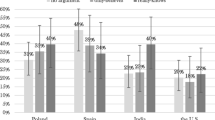Abstract
Allocating the burden of proof and intuitions in philosophical disputes.– This paper criticises the view that in philosophical disputes the onus probandi rests on those who advance a position that contradicts our basic intuitions. Such a rule for allocating the burden of proof may be an adequate reconstruction of everyday justification, but is unreasonable in the area of philosophy. In philosophy it is not only difficult to determine the plausibility of a proposition, at the same time contradictory claims may be equally plausible. – In contrast to such common sense proposals I try to show that in philosophical disputes the burden of proof does not depend on the material content of speech acts. A speaker simply bears the burden of proof for a proposition p if he has asserted that p and has agreed to justify it.
Similar content being viewed by others
LITERATUR
Austin, J. L.: 1979, ‘A Plea for Excuses’ in ders.: Philosophical Papers, Oxford, 175–204.
Barnes, J.: 1979, ‘Aristotle’s Concept of Mind’ in: ders. (Hg.), Articles on Aristotle, Vol. 4, London, 32–41.
Bieri, P.: 1997, ‘Generelle Einführung’ in: ders. (Hg.), Analytische Philosophie des Geistes, Weinheim, 1–28.
Brandom, R. B.: 1994, Making it Explicit. Reasoning, Representing, and Discursive Commitment, Cambridge (Mass.).
Davidson, D: 1985, ‘Wie ist Willenschwäche möglich?’ in ders.: Handlung und Ereignis, Frankfurt, 43–72.
Donat, J.: 1953, Logica et introductio in philosophiam christianam, Innsbruck.
Dummett, M.: 1976, ‘Comments’ in: Margalit, A. (Hg.), Meaning and Use, Dordrecht, 218–225.
Dummett, M.: 1993, The Logical Basis of Metaphysics, Cambridge (Mass.).
Gethmann, C. F.: 1987, ‘Letztbegründung vs. lebensweltliche Fundierung desWissens und Handelns’ in: Forum für Philosophie (Hg.), Philosophie und Begründung, Frankfurt, 268–302.
Gethmann, C. F.: 1993, Dasein: Erkennen und Handeln. Heidegger im phänomenologischen Kontext, Berlin.
Goodman, N.: 1988, Tatsache, Fiktion, Voraussage, Frankfurt.
Gräfrath, B.: 1997, Evolutionäre Ethik? Philosophische Programme, Probleme und Perspektiven der Soziobiologie, Berlin.
Hamblin, C. L.: 1970, Fallacies, London.
Hartmann, D.: 1998, ‘Kulturalistische Logikbegründung’ in: Janich, P. / Hartmann, D. (Hg.), Die kulturalistische Wende. Zur Orientierung des philosophischen Selbstverständnisses, Frankfurt, 57–128.
Hegselmann, R: 1985, Formale Dialektik. Ein Beitrag zu einer Theorie des rationalen Argumentierens, Hamburg.
Johansson, I.: 1937, ‘Der Minimalkalkül, ein reduzierter intuitionistischer Formalismus’ Compositio mathematica 4, 119–136.
Kamlah, W. and Lorenzen, P.: 1990, Logische Propädeutik. Vorschule des vernünftigen Redens, Mannheim.
Kamp, G.: 2001, Logik und Deontik. Zu den sprachlichen Instrumenten praktischer Vernunft, Paderborn.
Keil, G. and Schnädelbach, H. (Hg.): 2000, Naturalismus. Philosophische Beiträge, Frankfurt.
Kenny, A.: 1993, Aquinas on Mind, London.
Krabbe, E. C. W.: 2001, ‘The Problem of Retraction in Critical Discussion’ Synthese 127, 141–159.
Lewis, C. I.: 1914, ‘The Calculus of Strict Implication’ Mind 23, 240–247.
Lukasiewicz, J.: 1935, ‘Zur Geschichte der Aussagenlogik’ Erkenntnis 5, 111–131.
Niemann, H.-J.: 1999, ‘Die “Krise in der Erkenntnistheorie”. Sokal, Bricmont und die wissenschaftlichen Standards in der Philosophie’ Conceptus 32, 1–35.
Perelman, C. and Olbrechts-Tyteca, L.: 1958, Traité de l’argumentation. La nouvelle rhetorique, Brüssel.
Putnam, H.: 1994, ‘How Old Is the Mind?’ in: ders., Words and Life, Cambridge (Mass.), 3–21.
Read, S.: 1995, Thinking about Logic. An Introduction to the Philosophy of Logic, Oxford.
Reiter, R.: 1980, ‘A Logic for Default Reasoning’ Artificial Intelligence 13, 81–132.
Rescher, N.: 1977, Dialectics. A Controversy-Oriented Approach to the Theory of Knowledge, Albany.
Rescher, N.: 1997, Der Streit der Systeme. Ein Essay über die Gründe und Implikationen philosophischer Vielfalt, Würzburg.
Sander, T.: 2002, Redesequenzen. Untersuchungen zur Grammatik von Diskursen und Texten, Paderborn.
Schnädelbach, H.: 1977, Reflexion und Diskurs. Fragen einer Logik der Philosophie, Frankfurt.
Scholz, O. R.: 2001, Verstehen und Rationalität. Untersuchungen zu den Grundlagen von Hermeneutik und Sprachphilosophie, Frankfurt.
Schopenhauer, A.: 1988, Die Welt als Wille und Vorstellung Bd 1, Zürich.
Searle, J. R.: 1993, Die Wiederentdeckung des Geistes, München.
Sokal, A. and Bricmont, J.: 1999, Eleganter Unsinn. Wie die Denker der Postmoderne die Wissenschaften miß brauchen, München.
Tennant, N.: 1987, ‘Natural Deduction and Sequent Calculus for Intuitionistic Relevant Logic’ The Journal of Symbolic Logic 52, 665–680.
Tennant, N.: 1997, The Taming of the True, Oxford.
Tetens, H.: 1994, Geist, Gehirn, Maschine. Philosophische Versuche über ihren Zusammenhang, Stuttgart.
Toulmin, S.: 1958, The Uses of Arguments, Cambridge.
Wittgenstein, L.: 1991, The Blue and Brown Books, Oxford.
Wittgenstein, L.: 1984, Werkausgabe, Bd. 8, Frankfurt.
Ullmann-Margalit, E.: 1983, ‘On Presumtion’ The Journal of Philosophy 80, 143–163.
Author information
Authors and Affiliations
Rights and permissions
About this article
Cite this article
Sander, T. Beweislastverteilung und Intuitionen in philosophischen Diskursen. Journal for General Philosophy of Science 34, 69–97 (2003). https://doi.org/10.1023/A:1023281715255
Issue Date:
DOI: https://doi.org/10.1023/A:1023281715255




